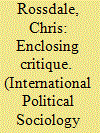|
|
|
Sort Order |
|
|
|
Items / Page
|
|
|
|
|
|
|
| Srl | Item |
| 1 |
ID:
146137


|
|
|
|
|
| Summary/Abstract |
The concept of ontological security has received increased attention in the security studies literature over the past ten years. This article develops a critical perspective toward ontological security and its mobilization by IR scholars, arguing that substantive ethical and political resources are produced by resisting the terms of ontological security/insecurity. It argues that the aspiration to ontological security, to contiguous and stable narratives of selfhood, can (violently) obscure the ways in which such narratives are themselves implicated in power relations. Furthermore, it argues that attempts to order political life into an ontological/security episteme disciplines or marginalizes modes of subjectivity which resist the closure of ontological security-seeking strategies. The article engages queer figurations of subjectivity as mobilized by Judith Butler, Donna Haraway, and Jack Halberstam, as well as examples from anti-militarist social movements, to demonstrate traditions which refuse and resist the framework of ontological security. It does this both in order to highlight particular practices and strategies that are written out by an epistemology oriented around ontological security/insecurity, and to show how a resistance to such ordering can enliven political action in various ways.
|
|
|
|
|
|
|
|
|
|
|
|
|
|
|
|
| 2 |
ID:
182655


|
|
|
|
|
| Summary/Abstract |
The past ten years have witnessed a revival in scholarship on militarism, through which scholars have used the concept to make sense of the embeddedness of warlike relations in contemporary liberal societies and to account for how the social, political and economic contours of those same societies are implicated in the legitimation and organization of political violence. However, a persistent shortcoming has been the secondary role of race and coloniality in these accounts. This article demonstrates how we might position racism and colonialism as integral to the functioning of contemporary militarism. Centring the thought and praxis of the US Black Panther Party, we argue that the particular analysis developed by Black Panther Party members, alongside their often-tense participation in the anti–Vietnam War movement, offers a strong reading of the racialized and colonial politics of militarism. In particular, we show how their analysis of the ghetto as a colonial space, their understanding of the police as an illegitimate army of occupation and, most importantly, Huey Newton’s concept of intercommunalism prefigure an understanding of militarism premised on the interconnections between racial capitalism, violent practices of un/bordering and the dissolving boundaries between war and police action.
|
|
|
|
|
|
|
|
|
|
|
|
|
|
|
|
|
|
|
|
|